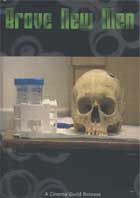
Brave New Men 2003
Distributed by Cinema Guild, 115 West 30th Street, Suite 800, New York, NY 10001; 212-685-6242
Produced by Parthenon Entertainment Ltd.
Directed by Jan Peter, Yury Winterberg
VHS, color, 45 min.
Sr. High - Adult
Genetics, Bioethics
Date Entered: 03/15/2006
Reviewed by Warren Hawkes, Library, New York State Nurses AssociationThese two productions provide differing perspectives relating to current issues in genetics and genetic engineering.
Brave New Men features interviews and the work of three of the world’s most prominent geneticists, Yang Huanning of China, Kari Stefansson of Iceland, and W. French Anderson of the United States. Each is afforded the chance to espouse their perspective on the current state of genetic research and the potential it possesses for scientific and medical advancement in the decades to come. Brief biographical background information and footage is provided for each individual. The interviewers capture the strength and determination of these individuals. However this production does have some quirkiness about it. The interview portions are provided in English. Beyond the content of the interviews, additional information is provided related to the topic of genetics and the human genome project. This content is presented in German with English subtitles. Although the viewer can manage to follow the content, it does make for difficult viewing and minimizes comprehension on some significant items.
Designer Babies: The Danger of Corporate Genetics takes a more critical look at the issues surrounding much of the current genetics works and the Human Genome Project not from a pure scientific standpoint but from the perspective of science being manipulated by corporations for the purpose of profits. The positive images that we saw created by the Brave New Men production are clearly undermined in this video. Kari Stefanson, who spoke so eloquently about the potential of genetics, masterminds a deal that gives his company DeCode sole rights to the vast collections of health and genetic information related to the people of Iceland. His company’s work is then funded with $300 million from a Swiss pharmaceutical firm. While in the U.S., Craig Venter is portrayed as leaving the National Institute of Health Human Genome Project and joining a private sector company, Celera Genomics, as lead scientist seemingly motivated by profits. Another project is outlined where the blood of indigenous people of Peru is collected by private companies because of the value of its DNA. An activist attorney addresses many of the potential dangers related to genetically-based treatments and says his commitment is to prevent any further disasters as he compares genetic based treatment to other treatments initially received with enthusiasm but later found to be more harmful than good. In the words of one activist, “People should never become products.”